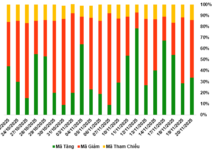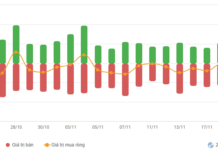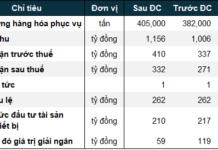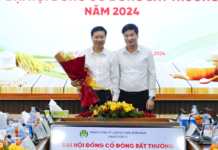
Prime Minister Pham Minh Chinh emphasized that there remains a lot of work to be done to accomplish the goals of the National Digital Transformation Program and Scheme 06. – Photo: VGP/Nhat Bac
|
The meeting was held online, connecting the Government Headquarters with the People’s Committees of provinces and centrally-run cities across the country.
Deputy Prime Minister Tran Luu Quang, Permanent Vice Chairman of the National Committee on Digital Transformation, ministers, leaders of ministries and sectors, members of the Committee, leaders of localities, and large technology corporations and enterprises attended the meeting.
In his opening remarks, Prime Minister Pham Minh Chinh emphasized that digital transformation has become an inevitable trend, an objective requirement, and a strategic choice for many countries. In Vietnam, digital transformation has reached “every alley, every house, and every person.”
“Our important tasks today, such as promoting growth, restructuring the economy, promoting old growth drivers, and exploring new growth drivers and emerging industries, are all closely related to digital transformation,” the Prime Minister said. Scheme 06 has been identified as a pivotal and critical task and one of the “bright spots” and “good models” of the National Digital Transformation.
In the past, the Government and the Prime Minister have resolutely directed and implemented synchronous solutions to make the National Digital Transformation more effective and practical; promoted digital transformation in most fields; and focused on building and perfecting institutions, mechanisms, and policies to promote the development of digital government, digital economy, digital society, and digital citizens.
At the same time, the Government has vigorously implemented Scheme 06 from the central to the grassroots levels, receiving the consensus and high appreciation of the people and businesses. This has contributed to changing management methods and improving the quality and efficiency of citizen management, saving time and effort, and laying an important foundation for the deployment of public online services.
The Prime Minister emphasized that there is still a lot of work to be done to accomplish the goals of the National Digital Transformation Program and Scheme 06. Some tasks are behind schedule, and some may not be achievable without strong, persistent, consistent, and synchronized direction from the central to local levels.
To continue effectively implementing the tasks of the National Digital Transformation and deploying Scheme 06, the Prime Minister suggested that delegates focus on discussing, analyzing, and evaluating frankly, clearly, and objectively the implementation of the 2024 Action Plan and the results achieved in the first six months of 2024.
At the same time, identify existing shortcomings, limitations, weaknesses, obstacles, barriers, and bottlenecks, especially in institutions, mechanisms, and policies; clearly point out the contents that are behind schedule (belonging to the responsibility of ministries, sectors, localities, and units) and determine the causes and draw lessons learned.
Along with this, share good experiences, valuable lessons, and creative ways of leadership, direction, administration, and implementation (developing digital infrastructure, providing online public services, developing the National Database, connecting and sharing information to form big data, training and developing human resources, and models and good practices of some ministries, sectors, and localities) and identify key tasks and breakthrough solutions for the coming time.
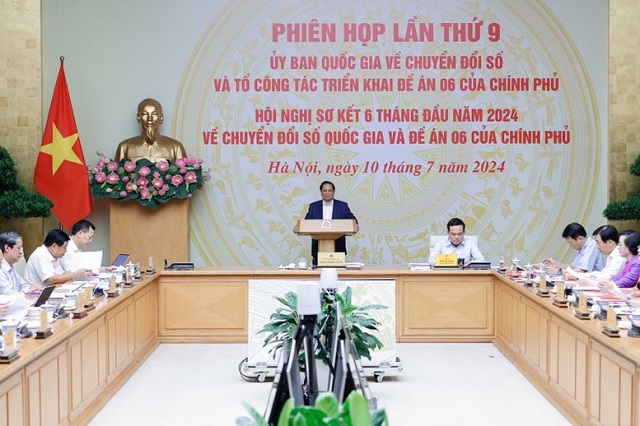 Prime Minister Pham Minh Chinh, Chairman of the National Committee on Digital Transformation, chaired the meeting. – Photo: VGP/Nhat Bac
|
According to the Ministry of Information and Communications, the National Digital Transformation in the first six months has achieved many outstanding results.
Accordingly, the rate of online public services and the rate of online dossiers (out of the total number of administrative procedure dossiers) nationwide reached 42% (compared to 17% at the end of 2023); for ministries and sectors, it reached 61% (compared to 38% at the end of 2023), and for localities, it reached 17% (compared to 9% at the end of 2023).
63/63 localities (an increase of 14 localities compared to the end of 2023) have issued policies to reduce or exempt fees and charges for the use of online public services; 15/63 localities (an increase of 2 localities compared to the end of 2023) have issued policies to reduce time to encourage people to use online public services.
The digital economy in the first six months is estimated to have grown by 22.4%, and the proportion of the digital economy in GDP is estimated at 18.3%. Revenue in the information technology field (digital economy ICT) is estimated at VND 1,928,311 billion, up 26% over the same period in 2023.
The total revenue of the five leading online retail floors in the first six months of 2024 reached over VND 97,000 billion, up 80% over the same period in 2023. The proportion of adult citizens with payment accounts reached 87.08% (up 9.67% compared to the end of 2023), exceeding the target set for 2025.
The pilot deployment of Mobile Money services has reached a total of more than 8.8 million customers, including 6.3 million customers in rural, mountainous, remote, and isolated areas, contributing to the Government’s goal of “leaving no one behind” in the digital transformation process.
The number of Vietnamese digital technology enterprises increased by 8% over the same period. The development of digital technology enterprises reached 50,350 enterprises compared to the target of 48,000 enterprises (achieving a rate of 104.9%).
In terms of digital governance, for the first time in more than 20 years, the monitoring and measurement of online public services have been automated. The administrative procedure handling system has been evaluated for quality online.
Also, in the past six months, for the first time, Vietnam has measured the quality of mobile and fixed broadband telecommunications services online using Make in Vietnam tools.
Data sharing transactions between platforms and information systems through the National Data Integration and Sharing Platform in the first six months increased by 67% over the same period in 2023.
Regarding digital infrastructure, the country has about 687,000 more households using fiber optic broadband Internet compared to the end of 2023, bringing the rate of households using fiber optic broadband Internet to 82.2% (up 2.6% compared to 79.6% at the end of 2023).
There are an additional 3.8 million mobile phone subscribers using smartphones, bringing the rate of mobile phone subscribers using smartphones to 84% (up 3.2% compared to 80.8% at the end of 2023).
Vietnam has one more modern and largest data center in the country of the Military Industry and Telecom Group (Viettel) with a capacity of 30 MW.
The rate of IPv6 conversion in Vietnam reached 60% (up 1% compared to the end of 2023), ranking 8th in the world (up 1 place compared to 2023).
Driving Digital Transformation in the HR Industry
Thanks to technology, the labor management tasks, procedures, and administrative processes that used to be done manually will be significantly reduced.


